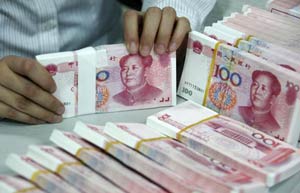China's lending slowdown not wet blanket on economy
By Li Xiaotang (chinadaily.com.cn) Updated: 2014-11-18 10:47The Chinese central bank released the October money supply data recently. While the country's new yuan lending rose 8.3 percent from a year ago to 548.3 billion yuan ($89.3 billion) last month, it represents a steep drop -- down about 36 percent -- from September. Aggregate new yuan loans totaled 8.23 trillion yuan in the first 10 months, up 12.9 percent year-on-year.
Three factors are attributable to the month-on-month fall in new yuan loans:
First, off-balance-sheet financing remains sluggish. Entrusted loans, trust loans and bankers' acceptances, which are all related to shadow banking, continue to shrink compared with a year earlier.
Second, the downward trend in the Chinese economy resulted in weak financing demand from the real economy -- mainly the property sector and private enterprises, and therefore banks are gradually tightening up money and credit supplies.
Third, after US quantitative easing policy exited, the US dollar entered a cycle of long-term appreciation, and hot money began gradually fleeing China amid global trends of dollar outflow back to the US.
Short-term fluctuations in financial data are unavoidable as the Chinese economy runs within a reasonable range.
The slowdown in lending growth is typical for a transitional stage, when the economy is switching to a slower growth rate, experiencing pains of structural adjustments and absorbing earlier stimulus. Therefore, it should not discourage expectations about the Chinese economy, which will surely grow stronger in the coming years, boosted by major cross-border endeavors such as the construction of the Silk Road Economic Belt and the 21st Century Maritime Silk Road.
The author is a certified financial planner and independent commentator. The views do not necessarily reflect those of China Daily.
 |
 |
| China's new yuan lending hits 548.3b yuan in Oct | Shanghai-Hong Kong Stock Connect kicks off |
- Cash crunch fans expectation on RRR cut
- US extends antidumping duties on China's thermal paper
- Modern food van with ancient look in Shanghai
- China home prices continue to cool in November
- Asia's top 3 billionaires all Chinese
- Old investment remedy the treatment for China's "new normal"
- China's solar sector opposes US anti-dumping ruling
- BMW to recall 846 cars in China
















